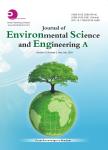Dechlorination Behavior of Mixed Plastic Waste by Employing Hydrothermal Process and Limestone Additive
Dechlorination Behavior of Mixed Plastic Waste by Employing Hydrothermal Process and Limestone Additive作者机构:Department of Environmental Science and Technology Tokyo Institute of Technology Yokohama 226-8502 Japan
出 版 物:《Journal of Environmental Science and Engineering》 (环境科学与工程(英文版))
年 卷 期:2011年第5卷第4期
页 面:432-439页
学科分类:08[工学] 0805[工学-材料科学与工程(可授工学、理学学位)] 080502[工学-材料学]
主 题:Plastic waste treatment chlorine removal hydrothermal process alkali additive
摘 要:The usage of plastic-impregnated waste derived solid fuel in conventional combustor is hindered by many technical factors, especially its organic chlorine content. In this paper, experimental study of hydrothermal treatment on mixed plastic waste using the mixture of polypropylene, polystyrene, polyethylene and polyvinyl chloride (PVC) has been performed to observe the dechlorination effect of hydrothermal treatment on the waste. The system was generally applying saturated steam at around 2.4 MPa in a stirring reactor for about 90 minutes. After undergoing the process, the organic chlorine in treated plastic waste was reduced to 1,700 ppm level while the inorganic chlorine content was increased, suggesting an organic chlorine conversion phenomenon to inorganic chlorine, accompanied with low pH due to dehydrochlorination process. Additional limestone (Ca(OH)2) in subsequent experiment showed that the similar phenomenon was occurred but with higher pH and lower chlorine content in the condensed water, suggesting the production of inorganic salt rather than hydrochloric acid. Laboratory scale experiment was also performed to confirm the dechlorination phenomena especially for PVC, and the result showed that the main parameter which affected the dechlorination phenomena was the amount of water in hydrothermal process rather than limestone addition. It is suggested that a combination ofhydrothermal process and alkali addition would produce a low-chlorine solid product from plastic waste, promoting its usage as alternative solid fuel.



